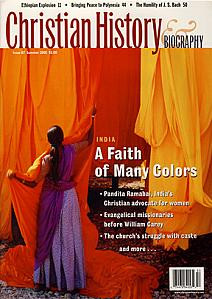Holy Spirit Fire Changed Ramabai's Community of Women

Ramabai (in white) poses with a few of the widows she rescued and trained.
IN THE WEE HOURS of the morning on 29 June, 1905, one of the girls from Pandita Ramabai’s community at Mukti, India, woke to see another girl on fire. She was about to douse her with a pail of water when she realized she was seeing a supernatural flame. She ran for a teacher, who found the girl praying, “O Lord, I am full of joy, but forgive and cleanse my sisters as you have me; give me strength to bear this sorrow for their sins.” Was this the beginning of a much-sought revival?
Ramabai had sent a her daughter and another woman to Australia a year earlier when revival broke out there, hoping they might return with spiritual power. Meanwhile, she had organized all willing women at Mukti into a daily prayer meeting and sent a team of thirty to preach in the villages surrounding Mukti.
On this day 30 June 1905, the evening following the dormitory “fire,” Ramabai spoke quietly to an assembly of women. Suddenly, a thousand of them began to confess their sins aloud at once. Unable to speak over the weeping and prayers, Ramabai wisely closed her mouth and allowed the Holy Spirit to complete His work.
In the following days, many saw their sins as never before and could not sleep until they found peace. Then they said the Holy Spirit burned within them like fire. Others, even little girls, were so lost in prayer they lifted their voices to God for hours, faces shining with a heavenly light. Women composed hymns on the spot. One hardened girl found Christ just days before she suddenly took ill. She told her nurse the Lord stood by her and was calling her to come, dying soon afterward.
Ramabai was an extraordinary woman, the first female Pandita (Hindu teacher). Her high-caste father had taught her to read Sanskrit, and she memorized 18,000 verses of Hindu Scripture and learned to read in five languages. Her father had taken his family across India, searching for the unknown god he worshipped and squandering his fortune in gifts to idols. When father and mother died, Ramabai and her brother continued the search, even as they were starving. On cold nights they buried themselves in sand, having no blankets. After years of fruitless service, they lost their faith in the Hindu gods.
Finally, they settled in Calcutta where Ramabai became a prominent female reformer. Steered toward Christ, she rejected European churches because they did not adapt to Indian customs. She joined a cult that claimed to merge Christian and Hindu beliefs.
Sure that God was prompting her to go to England, she went and was converted and baptized. Hindus criticized this as a betrayal of her roots. After training in the United States, she returned to India to educate Hindu girls and work among widows, many of whom were mere children. Opposition flared when Hindu girls began requesting baptism. Ramabai replied that she never pressured any student to become a Christian but only made the Bible available and demonstrated its truth by her life. Thereafter, she turned her family farm into a woman’s refuge called Mukti, “Salvation.” And truly salvation came to Mukti in 1905.
—Dan Graves
----- ------ ------
For more about Christianity in India, read Christian History #87, A Faith of Many Colors
For more true stories of women who changed the world, read our book Great Women in Christian History
For more about the Welsh revival that influenced Mukti, watch The Welsh Revivals of 1859 and 1904 at RedeemTV
The Welsh Revivals 1859 and 1904 can be purchased at Vision Video.








